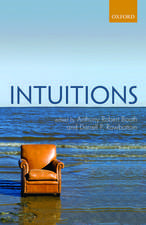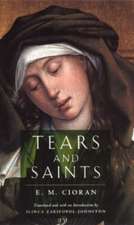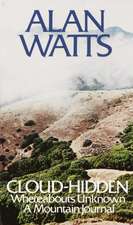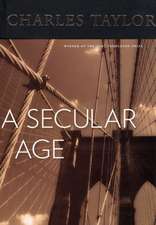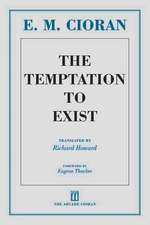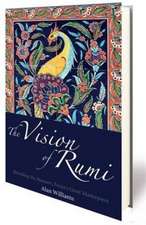Islamic Philosophy and the Ethics of Belief
Autor Anthony Robert Boothen Limba Engleză Hardback – 5 aug 2016
Preț: 448.38 lei
Nou
Puncte Express: 673
Preț estimativ în valută:
85.79€ • 89.59$ • 70.85£
85.79€ • 89.59$ • 70.85£
Carte tipărită la comandă
Livrare economică 15-29 aprilie
Preluare comenzi: 021 569.72.76
Specificații
ISBN-13: 9781137556998
ISBN-10: 1137556994
Pagini: 104
Ilustrații: X, 100 p.
Dimensiuni: 148 x 210 x 13 mm
Greutate: 0.27 kg
Ediția:1st ed. 2016
Editura: Palgrave Macmillan UK
Colecția Palgrave Pivot
Locul publicării:London, United Kingdom
ISBN-10: 1137556994
Pagini: 104
Ilustrații: X, 100 p.
Dimensiuni: 148 x 210 x 13 mm
Greutate: 0.27 kg
Ediția:1st ed. 2016
Editura: Palgrave Macmillan UK
Colecția Palgrave Pivot
Locul publicării:London, United Kingdom
Cuprins
Acknowledgements.- Chapter1: Falsafa as Ethics of Belief.- 1.1: Knowledge in Islam.- 1.2: TheEthics of Belief in the West.- 1.3: TheEthics of Belief in Islam.- 1.3.1: Imān vs Islam.- 1.3.2:Islamic Evidentialism.- 1.3.3:Moderate Evidentialism.- 1.3.4:Islamic Anti-Evidentialism.- 1.3.5:Moderate Anti-Evidentialism.- 1.4:Concluding Remarks.- Chapter 2: Certainty &Prophecy.- 2.1: TheQuestion of the Epistemic Elite.- 2.2: The Conditions of Certainty.- 2.3: TheActive Intellect and the Prophetic Imagination.- 2.4:Moderate Evidentialism vs. Moderate Anti-Evidentialism.- 2.5:Concluding Remarks.- Chapter 3: Prophecy &Politics.- 3.1: Human perfection.- 3.2: The Utopian City State.- 3.3: The Imperfect Cities,Liberalism and Democracy.- 3.4: Conclusion: Towards aNeo-Pyhrronism?.- References.
Notă biografică
Anthony Robert Boothis Senior Lecturer in Philosophy at the University of Sussex, UK. He also works for Trusting Banks, a NWO (DutchScience Foundation) funded collaboration between the Universities of Groningen,the Netherlands, and Cambridge, UK. He has worked mainly on issues at theintersection of ethics and epistemology, and has published articles appearingin such journals as Journal ofPhilosophy, Philosophy andPhenomenological Research and Synthese. He alsoco-edited Intuitions (2014).
Textul de pe ultima copertă
In this bookthe author argues that the Falasifa,the Philosophers of the Islamic Golden Age, are usefully interpreted throughthe prism of the contemporary, western ethics of belief. He contends that theirposition amounts to what he calls ‘Moderate Evidentialism’ – that only for theepistemic elite what one ought to believe is determined by one’s evidence. Theauthor makes the case that the Falasifa’s position is well argued, ingeniouslycircumvents issues in the epistemology of testimony, and is well worth takingseriously in the contemporary debate. He reasons that this is especially thecase since the position has salutary consequences for how to respond tothe sceptic, and for how we are to conceive of extremist belief.
Anthony Robert Booth is Senior Lecturer in Philosophy at the University of Sussex, UK. He also works for Trusting Banks, a NWO (Dutch Science Foundation) funded collaboration between the Universities of Groningen, the Netherlands, and Cambridge, UK. He has worked mainly on issues at the intersection of ethics and epistemology, and has published articles appearing in such journals as Journal of Philosophy, Philosophy and Phenomenological Research and Synthese. He also co-edited Intuitions (2014).
Anthony Robert Booth is Senior Lecturer in Philosophy at the University of Sussex, UK. He also works for Trusting Banks, a NWO (Dutch Science Foundation) funded collaboration between the Universities of Groningen, the Netherlands, and Cambridge, UK. He has worked mainly on issues at the intersection of ethics and epistemology, and has published articles appearing in such journals as Journal of Philosophy, Philosophy and Phenomenological Research and Synthese. He also co-edited Intuitions (2014).
Caracteristici
Offers a unique perspective on Farabi's work on sub-demonstrative knowledge Provides a rational reconstruction approach to some of the great Medieval Islamic Philosophers Explores ancient Islamic texts with an originally modern and western perspective


